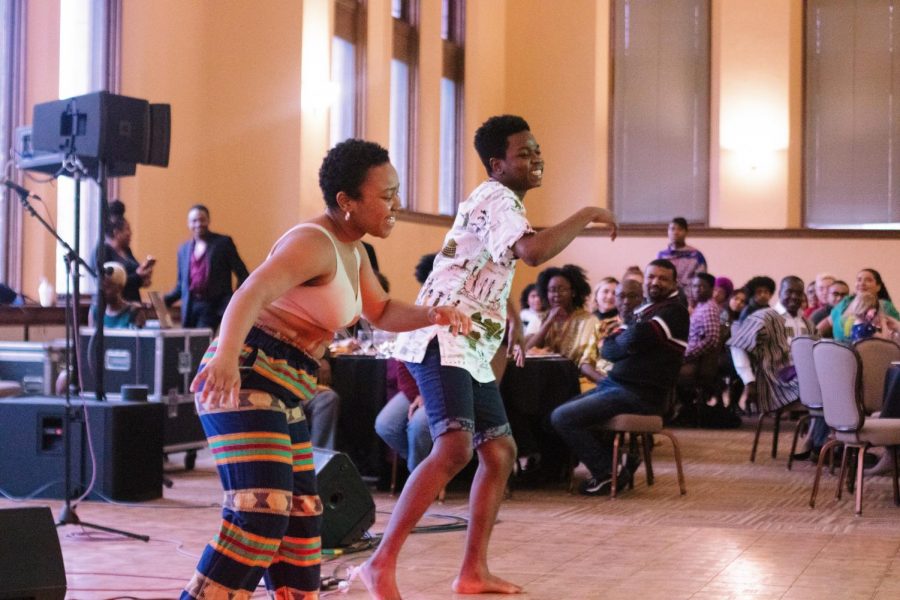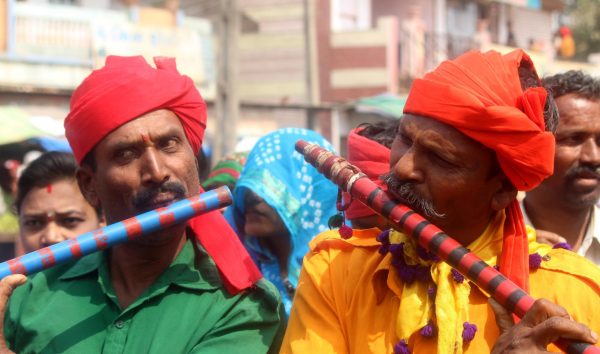ASA Banquet Highlight of Campus Afropolitan Week
Double-degree sophomore Kopano Muhammad and College sophomore Blessing Bwititi perform at last Saturday’s ASA banquet.
The African Students’ Association adorned the Carnegie Building’s Root Room in purple and gold decorations last Saturday for its annual banquet. The event showcased a vibrant expression of pride in African identity, promoting it as something that is both modern and rooted in tradition.
This year’s theme, Afropolitan, was a continuation of Afropolitan Week, a series that featured several other events hosted by ASA. Included in the week’s festivities were student-led panel “African in America,” an ASA TGIF at the ’Sco, and an Afropolitan Banquet after-party. The event’s poster read, “We are Afropolitans: Not citizens, but Africans of the world.” This theme promotes the visibility of African individuals as modern people, not as a primitive monolith created by European colonizers. Outdated representations of African people were addressed throughout the week’s events.
In the “African in America” panel, ASA members explored “questions of identity as it relates to racial and ethnic experience,” as described on the event’s Facebook page. Topics discussed included the duality of holding both an African and an American identity, the importance of language within that, the distinction between identifying as African versus identifying as Black, and the development of one’s own identity in American culture. The panelists noted the difference between being African and being African-American, and commented that American cultural identity is often based more on individual success rather than on communal happiness, in comparison to other cultures that prioritize the latter.
While sharing their experiences, ASA members noted that many people assume that African life holds a mystical quality — an untrue assumption which still persists due to European colonization. Even now, many people think in terms of how they can help African people and do not see African people as equals. The panel allowed attendees to learn about the details that create the experience of African identity.
Two days after the panel, ASA hosted TGIF at the ’Sco, playing African music hand-picked by ASA members. This event created excitement one day before the banquet and further increased the visibility of African individuals on campus.
The Afropolitan Banquet itself had a lively, welcoming atmosphere. The event was open to all and allowed a large variety of students, faculty, and guests alike to celebrate African culture. The event called for semi-formal wear, and attendees certainly delivered. Some came in traditional clothing, some in formal dress, and others wore a synthesis of the two.
ASA members were truly central at this event: The ceremony started with ASA members singing “Shosholoza,” a traditional South African song. College first-year Evans Muzulu sang a song he wrote himself; double-degree sophomore Kopano Muhammad and College sophomore Blessing Bwititi sang the song “Live and Die in Afrika” and danced to “Pata Pata” and “Gweta.” This dance mirrored the ASA members’ performance at Colors of Rhythm, highlighted by the many expressions of African identity. The performances were a highlight of the night, an opportunity to proclaim pride in being African and embody that identity on stage.
Attendance was high, and so was excitement. The audience clapped and whooped throughout these performances.
“I was really inspired by the different types of performances,” said College sophomore Mikaela Howard. “They just embodied life and gave me life in return.”
Not only were the performances fantastic, but the food was also amazing. While setting up the Root Room that morning, ASA members prepared dishes like Creole chicken and jollof rice. Also featured on the menu were coconut rice, plantains, red lentil stew, and puff puff, a West African street dish made of fried dough. Toward the end of the banquet, take-out containers were set next to the dishes for for attendees to take leftovers.
The banquet was an opportunity for African students to see their culture represented at Oberlin, and to share that with their broader community.
“Culture, food, music, traditional clothing, and the banquet to me just makes me feel like I’m back in Ethiopia,” College first-year Hermona Erdachew wrote in an email to the Review. “So the ASA banquet is very important because there’s really not a huge African community in Oberlin, and being able to host an event like this that brings a lot of people together is great.”
Yolanda Walker, OC ’09, delivered the keynote address. The night’s featured performer was Demola, a Nigerian Afrobeat violinist. He performed both traditional African songs and modern pop music. Towards the end of the night, he took requests, including one to play “Old Town Road.” As the banquet concluded, he expressed his gratitude for playing the event and his excitement for the night’s message.
College first-year Mowa Badmos said that her favorite part of the night was at the end when everyone was invited to dance.
“It was beautiful to watch [everyone] participate and embrace our African culture with us,” she wrote in an email to the Review. “As a minority group on campus, it is easy to forget we exist and this event makes sure our voices are heard. It also brings us together in a way we all enjoy and can be proud of.”
Tickets for this event were $10; all proceeds went to the Yakubu Saaka Fund, which provides financial support for international African students attending Oberlin. Not only were tickets sold out, but a waitlist also ensured that as many people as possible could attend.
Afropolitan Week concluded with an after-party in the ’Sco, truly concluding in a celebration. ASA members gave non-African students an experience that provided an important opportunity to learn about African culture and become aware of false stereotypes. In this Afropolitan message lies the hope that individuals will understand the meaning of this week-long event and use these experiences to educate others. This event was surely one worth attending and will continue to be in future years.











